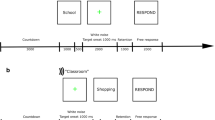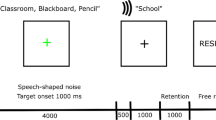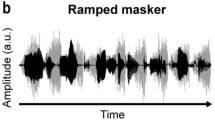Abstract
When speech is presented in noise, listeners must recruit cognitive resources to resolve the mismatch between the noisy input and representations in memory. A consequence of this effortful listening is impaired memory for content presented earlier. In the first study on effortful listening, Rabbitt, The Quarterly Journal of Experimental Psychology, 20, 241–248 (1968; Experiment 2) found that recall for a list of digits was poorer when subsequent digits were presented with masking noise than without. Experiment 3 of that study extended this effect to more naturalistic, passage-length materials. Although the findings of Rabbitt’s Experiment 2 have been replicated multiple times, no work has assessed the robustness of Experiment 3. We conducted a replication attempt of Rabbitt’s Experiment 3 at three signal-to-noise ratios (SNRs). Results at one of the SNRs (Experiment 1a of the current study) were in the opposite direction from what Rabbitt, The Quarterly Journal of Experimental Psychology, 20, 241–248, (1968) reported – that is, speech was recalled more accurately when it was followed by speech presented in noise rather than in the clear – and results at the other two SNRs showed no effect of noise (Experiments 1b and 1c). In addition, reanalysis of a replication of Rabbitt’s seminal finding in his second experiment showed that the effect of effortful listening on previously presented information is transient. Thus, effortful listening caused by noise appears to only impair memory for information presented immediately before the noise, which may account for our finding that noise in the second-half of a long passage did not impair recall of information presented in the first half of the passage.


Similar content being viewed by others
Notes
Note that the accounts described here are those that have been proposed to explain the effects of unintelligible noise (e.g., speech-shaped noise, white noise) on recall of speech; other explanations have been proposed when the masking consists of speech (e.g., multi-talker babble). For example, phonological and semantic information in the masker may interfere with encoding of the target speech, and segregating the target speech and masker streams may draw resources away from encoding (see Heinrich et al., 2008).
A potential concern is that by presenting the questions in a random order, the first questions may refer to content from the end of the second half of the passage, meaning they could conceivably be answered by drawing on information from working memory rather than long-term memory. However, our focus is on how well participants retain information from the first half of the passage – which ended more than 2 min before the questions were presented. Therefore, regardless of the order in which the questions are asked, participants must draw on long-term memory to answer questions about the first half of the passage.
A likelihood ratio test indicated that excluding this random slope did not significantly affect model fit (see R script for more details).
A likelihood ratio test indicated that excluding these random slopes did not significantly affect model fit (see R script for details).
Note that although the odds ratio for the effect of noise appears to be numerically lower in position 1 than in positions 2 and 3 in Fig. 2, re-leveling the interaction model such that position 1 is coded as the reference level reveals that that the effect of noise is not significantly stronger in position 1 than in the middle two positions.
References
Anwyl-Irvine, A. L., Massonnié, J., Flitton, A., Kirkham, N., & Evershed, J. K. (2020). Gorilla in our midst: An online behavioral experiment builder. Behavior Research Methods, 52(1), 388–407.
Bartsch, L. M., & Oberauer, K. (2023). The contribution of episodic long-term memory to working memory for bindings. Cognition, 231, 105330.
Bartsch, L. M., Singmann, H., & Oberauer, K. (2018). The effects of refreshing and elaboration on working memory performance, and their contributions to long-term memory formation. Memory & Cognition, 46(5), 796–808.
Bates, D., Mächler, M., Bolker, B., & Walker, S. (2015). Fitting linear mixed-effects models using lme4. Journal of Statistical Software, Articles, 67(1), 1–48.
Brady, T. F., Robinson, M. M., & Williams, J. R. (2024). Noisy and hierarchical visual memory across timescales. Nature Reviews Psychology, 3, 1–17.
Cousins, K. A. Q., Dar, H., Wingfield, A., & Miller, P. (2014). Acoustic masking disrupts time-dependent mechanisms of memory encoding in word-list recall. Memory & Cognition, 42(4), 622–638.
Crandall, C. S., & Sherman, J. W. (2016). On the scientific superiority of conceptual replications for scientific progress. Journal of Experimental Social Psychology, 66, 93–99.
Crouse, J. H. (1971). Retroactive interference in reading prose materials. Journal of Educational Psychology, 62(1), 39–44.
Dempster, F. N. (1988). Retroactive interference in the retention of prose: A reconsideration and new evidence. Applied Cognitive Psychology, 2(2), 97–113.
Guang, C., Lefkowitz, E., Dillman-Hasso, N., Brown, V. A., & Strand, J. F. (2021). Recall of speech is impaired by subsequent masking noise: A replication of Rabbitt (1968) Experiment 2. Auditory Perception & Cognition. https://doi.org/10.1080/25742442.2021.1896908
Heinrich, A., Schneider, B. A., & Craik, F. I. M. (2008). Investigating the influence of continuous babble on auditory short-term memory performance. Quarterly Journal of Experimental Psychology, 61(5), 735–751.
Kuznetsova, A., Brockhoff, P., & Christensen, R. (2017). lmerTest package: Tests in linear mixed effects models. Journal of Statistical Software, Articles, 82(13), 1–26.
Mattys, S. L., Davis, M. H., Bradlow, A. R., & Scott, S. K. (2012). Speech recognition in adverse conditions: A review. Language and Cognitive Processes, 27(7–8), 953–978.
McCoy, S. L., Tun, P. A., Cox, L. C., Colangelo, M., Stewart, R. A., & Wingfield, A. (2005). Hearing loss and perceptual effort: Downstream effects on older adults’ memory for speech. The Quarterly Journal of Experimental Psychology A, Human Experimental Psychology, 58(1), 22–33.
Murphy, D. R., Craik, F. I. M., Li, K. Z. H., & Schneider, B. A. (2000). Comparing the effects of aging and background noise on short-term memory performance. Psychology and Aging, 15(2), 323–334.
Piquado, T., Benichov, J. I., Brownell, H., & Wingfield, A. (2012). The hidden effect of hearing acuity on speech recall, and compensatory effects of self-paced listening. International Journal of Audiology, 51(8), 576–583.
Piquado, T., Cousins, K. A. Q., Wingfield, A., & Miller, P. (2010). Effects of degraded sensory input on memory for speech: Behavioral data and a test of biologically constrained computational models. Brain Research, 1365, 48–65.
R Core Team. (2022). R 4.2.1. R Foundation for Statistical Computing.
Rabbitt, P. M. (1968). Channel-capacity, intelligibility and immediate memory. The Quarterly Journal of Experimental Psychology, 20(3), 241–248.
Rabbitt, P. M. (1991). Mild hearing loss can cause apparent memory failures which increase with age and reduce with IQ. Acta Oto-Laryngologica. Supplementum, 476, 167–175. discussion 176.
Rönnberg, J., Rudner, M., Foo, C., & Lunner, T. (2008). Cognition counts: A working memory system for ease of language understanding (ELU). International Journal of Audiology, 47(sup2), S99–S105.
Simons, D. J. (2014). The value of direct replication. Perspectives on Psychological Science: A Journal of the Association for Psychological Science, 9(1), 76–80.
Strand, J. F., Ray, L., Dillman-Hasso, N. H., Villanueva, J., & Brown, V. A. (2021). Understanding speech amid the jingle and jangle: Recommendations for improving measurement practices in listening effort research. Auditory Perception & Cognition, 3(4), 1–20.
Van Dyke, J. A. (2011). Cue-dependent interference in comprehension. Journal of Memory and Language, 65(3), 247–263.
Ward, C. M., Rogers, C. S., Van Engen, K. J., & Peelle, J. E. (2016). Effects of age, acoustic challenge, and verbal working memory on recall of narrative speech. Experimental Aging Research, 42(1), 97–111.
Wasiuk, P. A., Radvansky, G. A., Greene, R. L., & Calandruccio, L. (2021). Spoken narrative comprehension for young adult listeners: effects of competing voices and noise. International Journal of Audiology, 60(9), 711–722.
Watkins, O. C., & Watkins, M. J. (1975). Buildup of proactive inhibition as a cue-overload effect. Journal of Experimental Psychology Human Learning and Memory, 1(4), 442–452.
Wickham, H., Averick, M., Bryan, J., Chang, W., McGowan, L., François, R., Grolemund, G., Hayes, A., Henry, L., Hester, J., Kuhn, M., Pedersen, T., Miller, E., Bache, S., Müller, K., Ooms, J., Robinson, D., Seidel, D., Spinu, V., …, & Yutani, H. (2019). Welcome to the Tidyverse. Journal of Open Source Software, 4(43), 1686.
Williams, J. R., Brady, T. F., & Störmer, V. S. (2022). Guidance of attention by working memory is a matter of representational fidelity. Journal of Experimental Psychology Human Perception and Performance, 48(3), 202–231.
Winn, M. B. (2018). Praat script for creating speech-shaped noise [software] version 12. http://www.mattwinn.com/praat.html
Wixted, J. T. (2010). The role of retroactive interference and consolidation in everyday forgetting. Forgetting., 338, 285–312.
Funding
This work was supported by Carleton College and the National Institutes of Health via the National Institute on Deafness and Communication Disorders (R15-DC018114; R15-DC018114-02). We are grateful to Claire Guang, Naseem Dillman-Hasso, Helen Hu, and Gigi Paulig for technical assistance and research support.
Author information
Authors and Affiliations
Corresponding author
Additional information
Publisher's Note
Springer Nature remains neutral with regard to jurisdictional claims in published maps and institutional affiliations.
Open Practices Statement
All data, code for analysis, and stimuli are available via the Open Science Framework at: https://osf.io/znv7a/, and the preregistration document for Experiment 1 at: https://osf.io/bj3tw. Experiment 2 was a reanalysis of existing data from our lab and was not preregistered.
Rights and permissions
Springer Nature or its licensor (e.g. a society or other partner) holds exclusive rights to this article under a publishing agreement with the author(s) or other rightsholder(s); author self-archiving of the accepted manuscript version of this article is solely governed by the terms of such publishing agreement and applicable law.
About this article
Cite this article
Brown, V.A., Sewell, K., Villanueva, J. et al. Noisy speech impairs retention of previously heard information only at short time scales. Mem Cogn (2024). https://doi.org/10.3758/s13421-024-01583-y
Accepted:
Published:
DOI: https://doi.org/10.3758/s13421-024-01583-y




